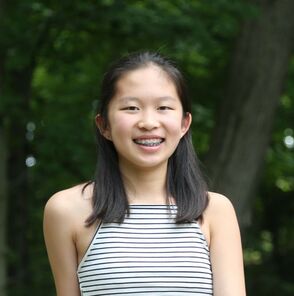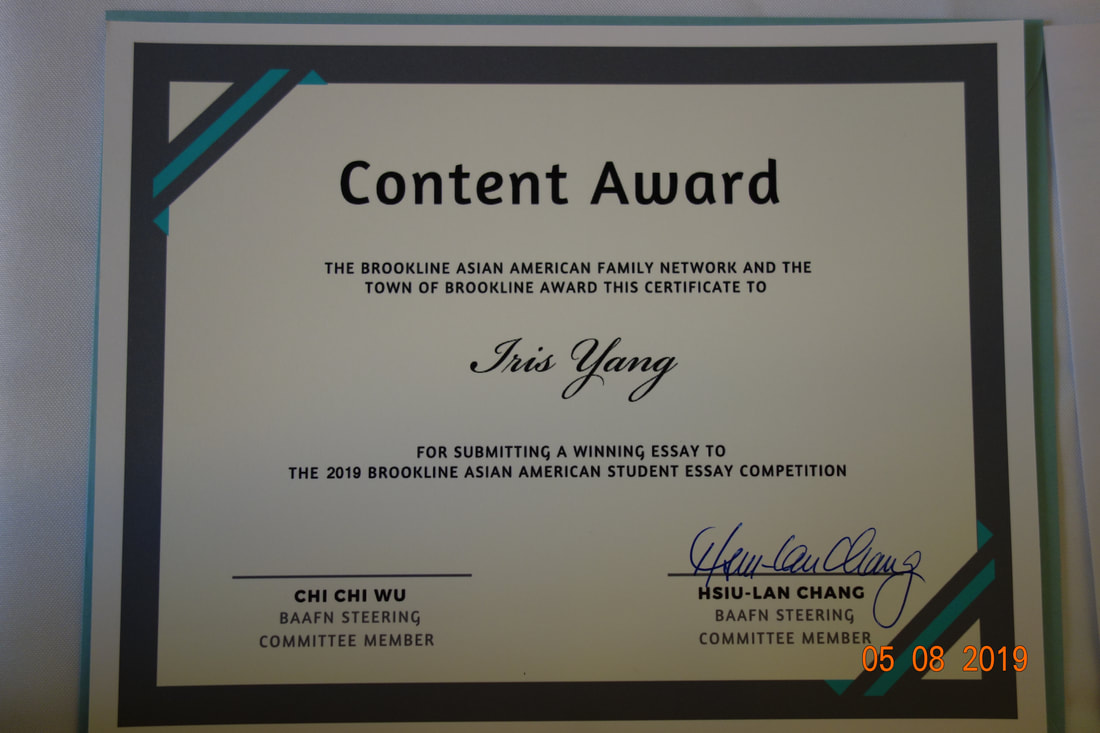2019 BAAFN Content Award
Years of Thought
by Iris Yang
by Iris Yang
I used to be scared of being too Chinese. If people wondered what instruments I played, I immediately said I sang before shyly adding that I also played piano. If people asked what my favorite school subject was, I often said French, despite the truth being that I loved math. If their questions extended to the language I spoke at home, I answered English defensively, even though they were just being curious. I danced around cultural stereotypes as much as I could, but they were never far from my mind.
I was afraid of spending my sunny Sunday afternoons at Chinese school attempting to learn Mandarin. As a young girl, I both feared and hated it. I struggled with writing and reading and foreign words extracted themselves from my mouth gingerly, slowly. I found it difficult to motivate myself to study, and today can easily bring to memory the countless times I begged my parents, “Please let me skip, just this once”. Somehow, I graduated from the tenth grade. Afterwards, I felt untethered, like there was nothing forcing me to practice my Chinese anymore. The amount I spoke at home dropped on a yearly basis until Chinese simply became a thing for me to curry favor with my parents, a way to get what I wanted.
After entering Brookline High School, I learned to treasure my Asian heritage. It was not a simple, overnight transformation; it was only following many years and hours of self-reflection that I began to love the different aspects of my identity that I used to try to conceal. Then, instead of being afraid of embracing my culture, I became afraid of forgetting.
At the start of last year, it dawned on me that the last time I had visited China, where almost my entire extended family resides, had been more than three years ago. During that long time span, almost a quarter of my entire life, my aunt had given birth to an adorable baby cousin who I had never met, only Facetimed. Though she was a mere two years old during my time of contemplation, I had no doubt that her native Chinese will soon surpass my rough version of the language. I was afraid that I had wasted around a decade at Chinese school, afraid of losing the language of my ancestors, and afraid that my inability to communicate fluently would expose me as a fraud when I returned to China.
At the same time, I was afraid of not fitting in with my more “American” friends, those whose parents had grown up in America, the ones who held huge parties for the Super Bowl and the Golden Globes and the Fourth of July. My family did celebrate these events, to be sure, but not in such an extravagant manner. Sometimes when I brought my aromatic Chinese leftovers to school lunch, I received peculiar looks from nearby strangers. When I was on a college tour, the guide automatically assumed my family was from China despite the fact that I was born and raised in America. Small, sometimes unconscious things like this made me fear that I would always be seen as the outsider, seen as too Chinese.
For a long while, I struggled to balance these seemingly disparate aspects of myself and leapt constantly from one side to another. Finally, though, I realized that it was possible to not have to choose, radically shifting my perspective. To me, being Asian American is being able to have the best of both worlds, enjoying hamburgers and fries for lunch, and gorging myself on homemade dumplings and traditional green bean soup for dinner. It is that powerful connection I can create with another Chinese-American when we share our experiences with quintessential Chinese tiger parents. It is being able to wear blue, white, and red on the Fourth of July, and don red and yellow during the Lunar New Year; the colors overlap, but not completely, just as my identity is a distinct mix of both countries. It is growing up in a bilingual household, a gift I would never give up just to fit in a single cultural world. Being Asian American is staying up until midnight playing mahjong with my family and watching old Hollywood films, and it is the very root of my identity. I am Chinese, and I am American, and I am something more than each individual part.
I was afraid of spending my sunny Sunday afternoons at Chinese school attempting to learn Mandarin. As a young girl, I both feared and hated it. I struggled with writing and reading and foreign words extracted themselves from my mouth gingerly, slowly. I found it difficult to motivate myself to study, and today can easily bring to memory the countless times I begged my parents, “Please let me skip, just this once”. Somehow, I graduated from the tenth grade. Afterwards, I felt untethered, like there was nothing forcing me to practice my Chinese anymore. The amount I spoke at home dropped on a yearly basis until Chinese simply became a thing for me to curry favor with my parents, a way to get what I wanted.
After entering Brookline High School, I learned to treasure my Asian heritage. It was not a simple, overnight transformation; it was only following many years and hours of self-reflection that I began to love the different aspects of my identity that I used to try to conceal. Then, instead of being afraid of embracing my culture, I became afraid of forgetting.
At the start of last year, it dawned on me that the last time I had visited China, where almost my entire extended family resides, had been more than three years ago. During that long time span, almost a quarter of my entire life, my aunt had given birth to an adorable baby cousin who I had never met, only Facetimed. Though she was a mere two years old during my time of contemplation, I had no doubt that her native Chinese will soon surpass my rough version of the language. I was afraid that I had wasted around a decade at Chinese school, afraid of losing the language of my ancestors, and afraid that my inability to communicate fluently would expose me as a fraud when I returned to China.
At the same time, I was afraid of not fitting in with my more “American” friends, those whose parents had grown up in America, the ones who held huge parties for the Super Bowl and the Golden Globes and the Fourth of July. My family did celebrate these events, to be sure, but not in such an extravagant manner. Sometimes when I brought my aromatic Chinese leftovers to school lunch, I received peculiar looks from nearby strangers. When I was on a college tour, the guide automatically assumed my family was from China despite the fact that I was born and raised in America. Small, sometimes unconscious things like this made me fear that I would always be seen as the outsider, seen as too Chinese.
For a long while, I struggled to balance these seemingly disparate aspects of myself and leapt constantly from one side to another. Finally, though, I realized that it was possible to not have to choose, radically shifting my perspective. To me, being Asian American is being able to have the best of both worlds, enjoying hamburgers and fries for lunch, and gorging myself on homemade dumplings and traditional green bean soup for dinner. It is that powerful connection I can create with another Chinese-American when we share our experiences with quintessential Chinese tiger parents. It is being able to wear blue, white, and red on the Fourth of July, and don red and yellow during the Lunar New Year; the colors overlap, but not completely, just as my identity is a distinct mix of both countries. It is growing up in a bilingual household, a gift I would never give up just to fit in a single cultural world. Being Asian American is staying up until midnight playing mahjong with my family and watching old Hollywood films, and it is the very root of my identity. I am Chinese, and I am American, and I am something more than each individual part.



